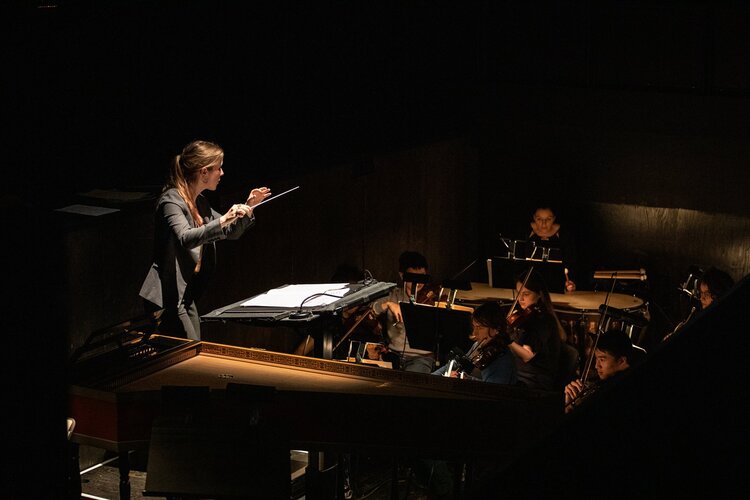
Spring: time for daffodils to wave in wind willy-nilly. Time for the New! At Bard College’s Fisher Center, it was time for young conductors to flex their new skills at air sculpting with a program titled Serenade to Eros and Thanatos (Love and Death). First, out of the cocoon, was conductor David Mascari with Tchaikovsky’s masterpiece Souvenir de Florence, OP. 70 (1892). A sketch of one of the movements was written in Florence during the summer of 1890 when he wrote the opera Queen of Spades.
This rather enchanting memory of Florence with recollections of sculpture, paintings, architecture, the flow of the Arno river, the lush north bank gardens, the voices of young singers has remained a favorite of audiences. Originally a string sextet for two violins, two violas, and two cellos, there is an orchestral arrangement by Yuli Turovsky, used here by The Orchestra Now. Both remain successful version. While the sextet evokes charm and intimacy, the orchestral version paints with more vibrant and extroverted excitement while the strings sing much more lushly. The latter is dominated by the violins, while the cellos dominate the original sextet version. Maestro Mascari produced a blooming bouquet for his first appearance at the podium.

Mascari and the orchestra then offered the World Premiere of Tartarus by the Conductor himself. The Prologue produced slow growling sounds evoking fear, then violins began a chant-like motif. While the movement continued downward into darkness, the conclusion featured a reversal: the marvelous fields of Elysium. The work was an allegory about our current pandemic and the eventual happy conclusion with a miraculous vaccine.

Conductor Shutong Li took the podium for another string fest, Antonín Dvořák’s Serenade for Strings, OP. 22 (1875). The cyclical theme of this serenade has made it a perennial favorite, especially the wistful middle of the five movements, giving the Conductor the opportunity to meld memory with unity of sound that recreates images of the lost past. The contrasting themes of present and past was perhaps Dvořák’s great and powerful gift which was here evoked with tenderness.
Inure by Christopher Bell (b. 1996) presented another World Premiere. Pregnant pauses played a significant dramatic role in this composition—silence itself held a musical function. This pausal punctuation presented a particular challenge to conductor and players with meditative force. The sharp cutoffs were handled superbly by both conductor and orchestra. The finale presented a mysterious, meditative atmosphere like a sunset that lingers in memory.

Conductor Micah Gleason (who is also a professional mezzo-soprano) raised the baton to perform Leyendas: An Andean Walkabout (2016) by prominent composer and current Philadelphia Orchestra Composer-in-Residence Gabriela Lena Frank. A few years ago, I had heard Eugenia Zuckerman perform one of the four movements of this work (arranged for flute) and was grateful to hear the complete work which remains redolent with landscape and the rushing winds of mountain air. Yet the eerie third movement was an unexpected and introverted revelation that moved me deeply. The broad strokes of the folk tune conclusion made me want to leave my chair and dance under the open sky, but, alas, our Spring is not quite at apex, although the musical portrait was there as a memorable harbinger of the immanent!
To descend this mountain Conductor Gleason waved on the Adagietto from Gustav Mahler’s Symphony No. 5 which functioned as a soothing balm to both those moments of death-terror and love-exuberance conjured by this long program of over two hours. Conducted with subtlety and finesse, this was a smooth aperitif.
These three conducting degree recitals were professional and exciting. We expect to hear the work of all three conductors from different podiums in the future.
You may view and hear this performance which was broadcast live on May 27th at this YouTube link: https://www.youtube.com/watch?v=N-FdIVUctmo.